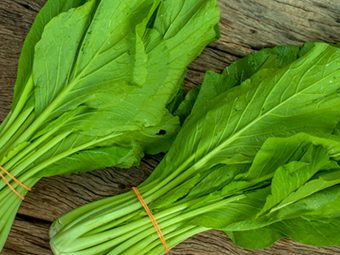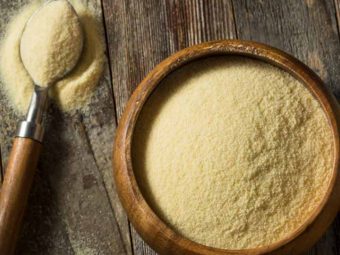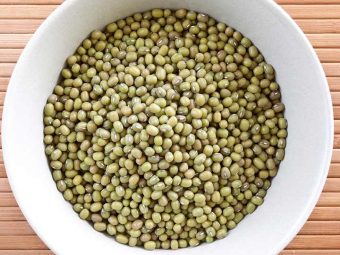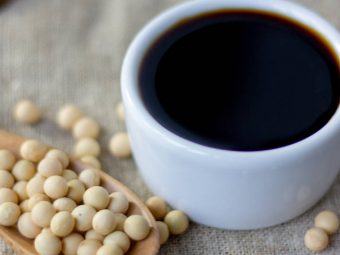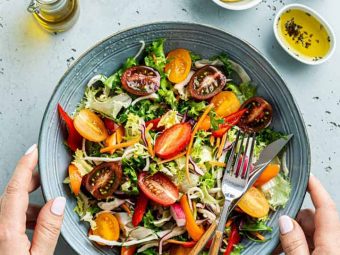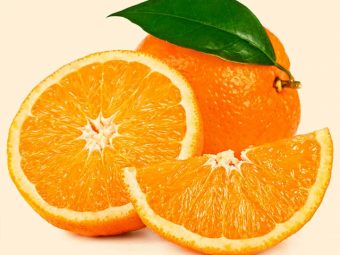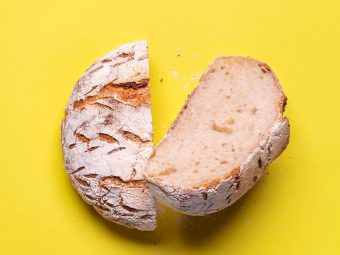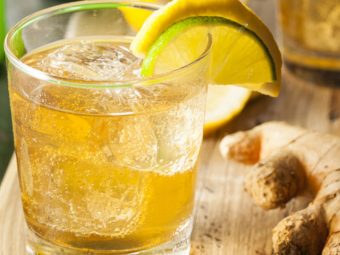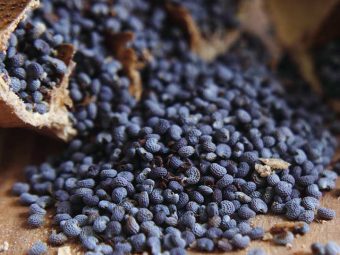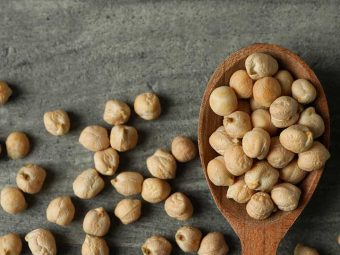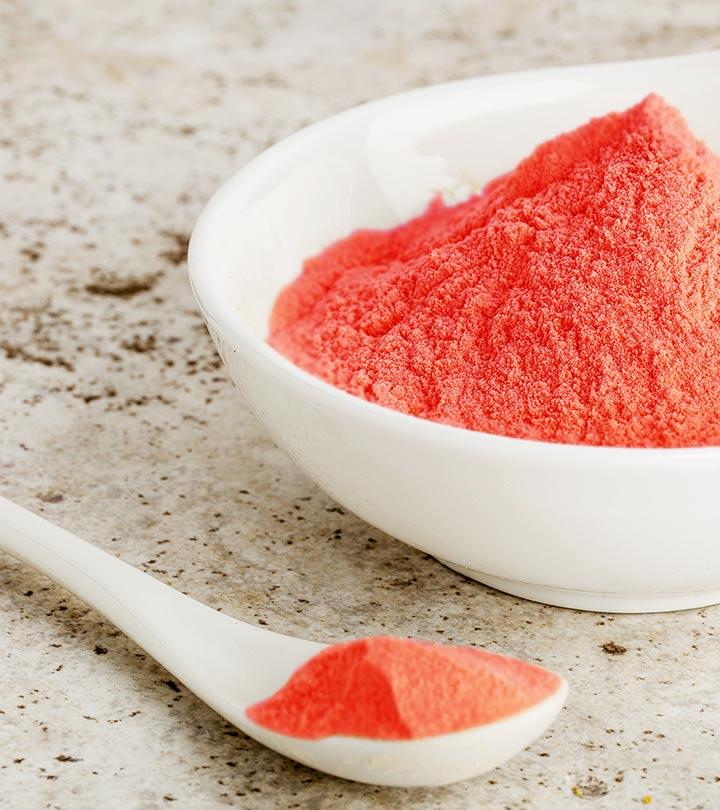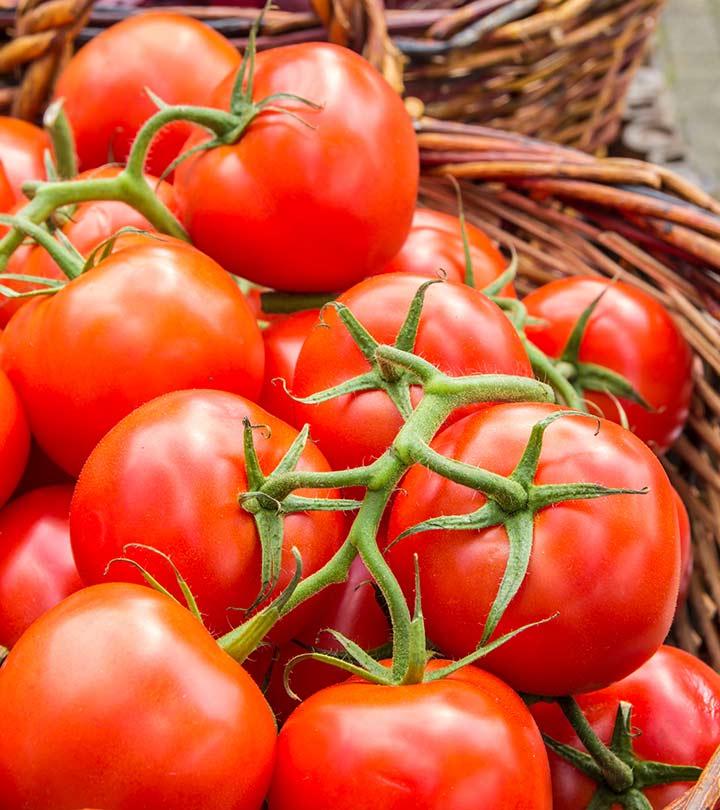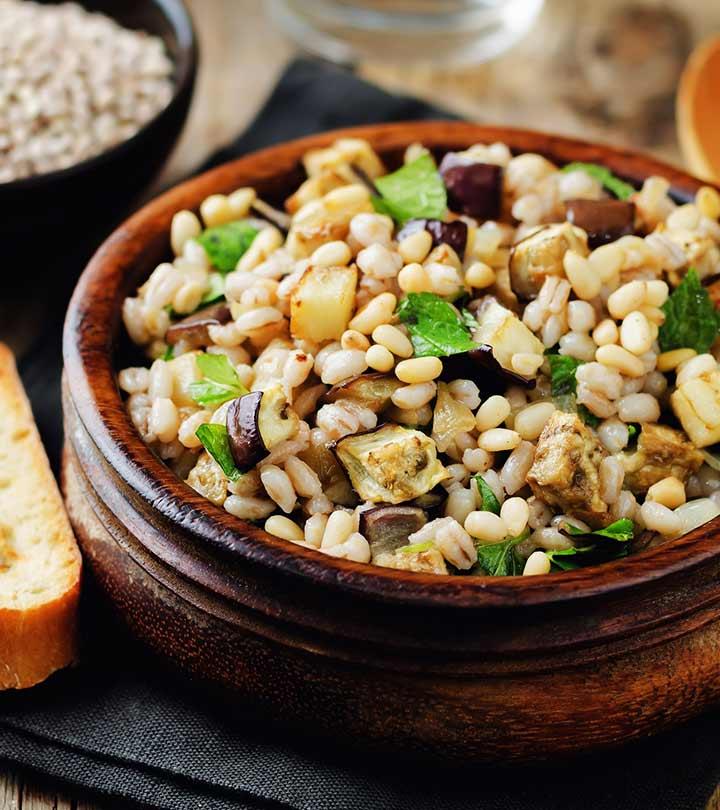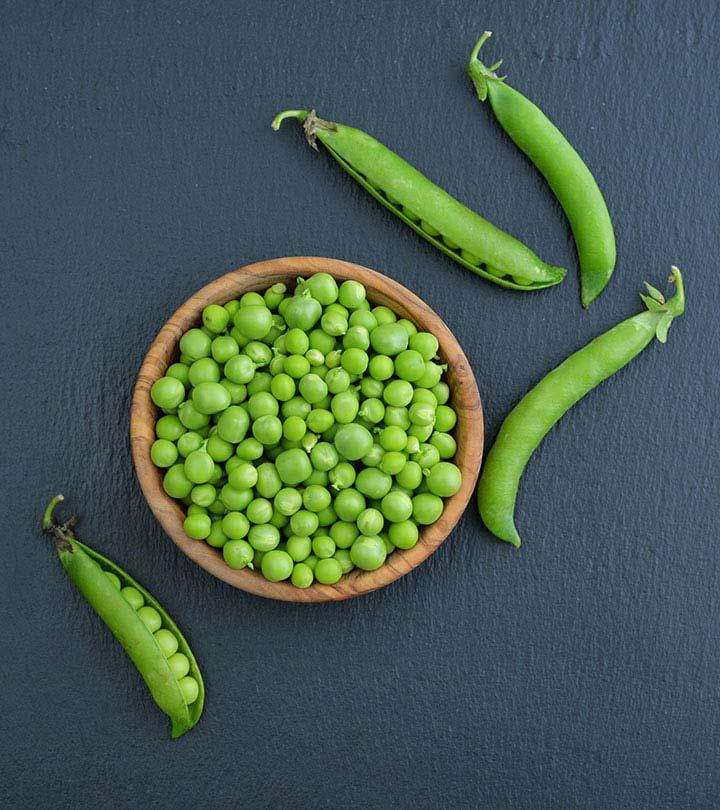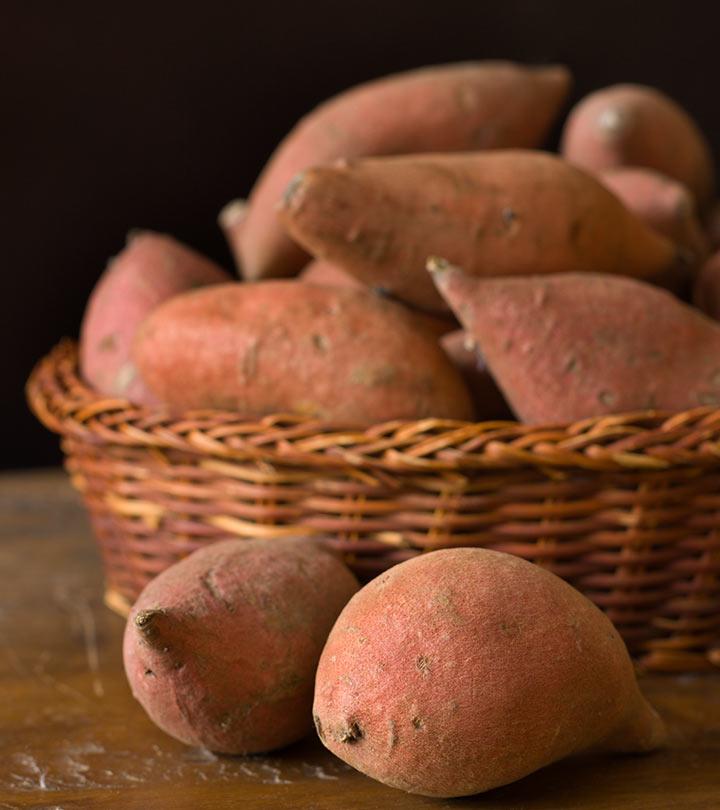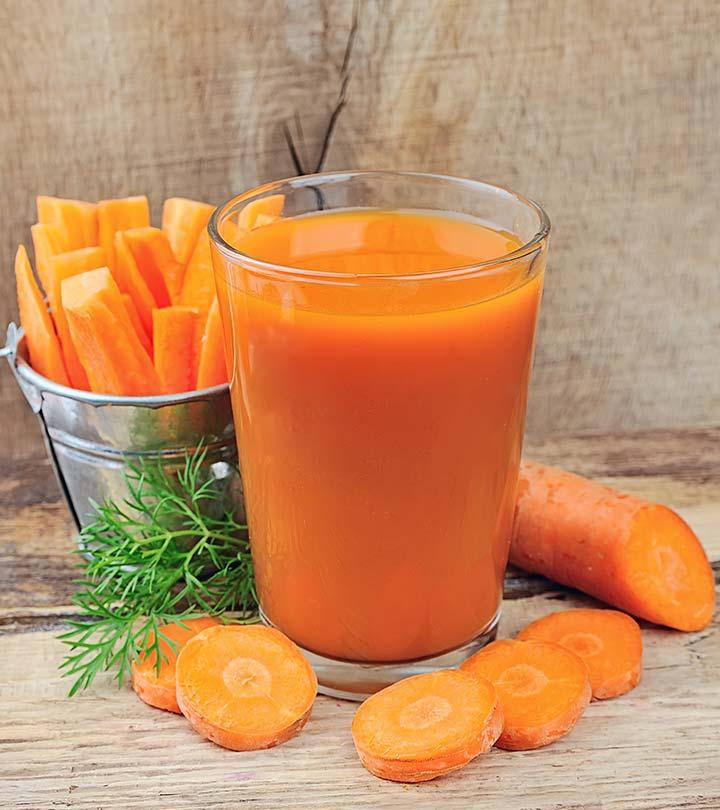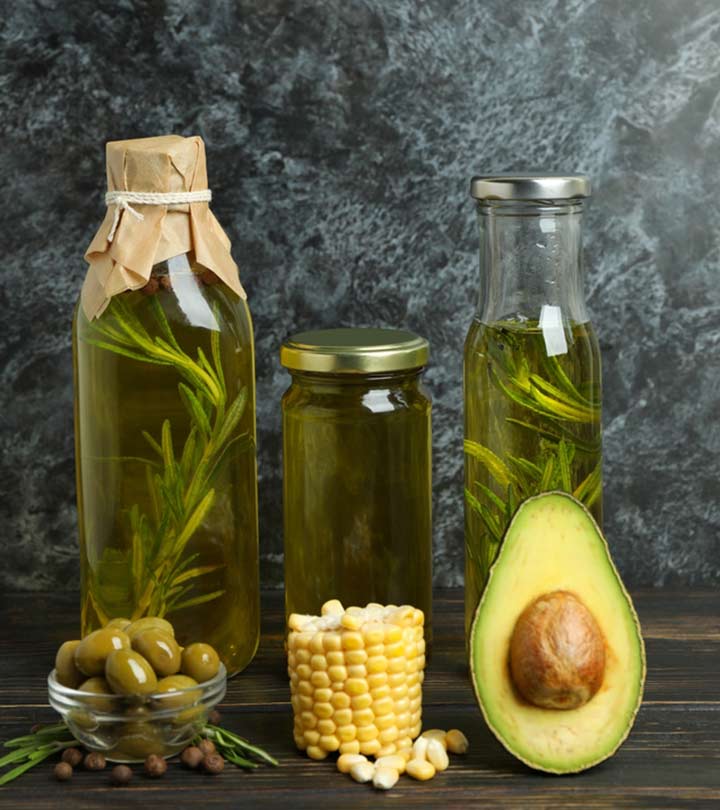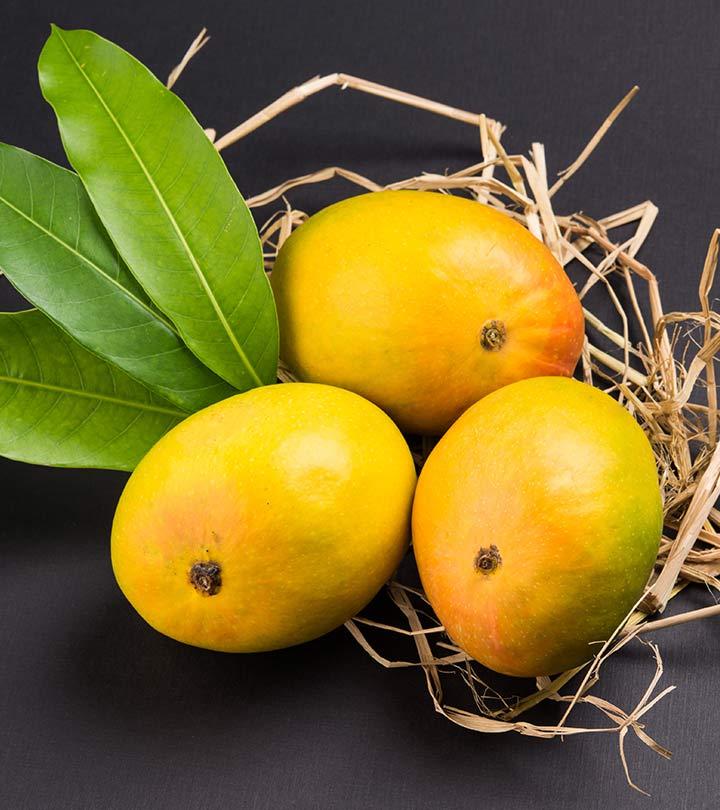Benefits Of Nutritional Yeast, How To Use It, Recipes, & Risks
Unveil the power of nutritional yeast one bite at a time.
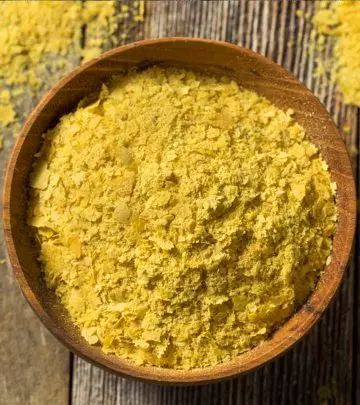
Image: Shutterstock
The benefits of nutritional yeast are gaining attention as a dietary supplement and energy and digestion booster. It is generally used to make homemade bread fluffy and impart a spongy texture to the baked goodies. However, have you ever wondered what makes nutritional yeast a valuable addition to your diet? Read this article to know more about nutritional yeast, its nutrition facts, health benefits it offers. Scroll down.
In This Article
What Is Nutritional Yeast?
Nutritional yeast, unlike regular yeast, is a deactivated form of yeast that is edible and is known to have a cheese-like flavor. It belongs to the Saccharomyces cerevisiae family, has a yellow-vermillion-like color and a flaky or powdered texture. Although it belongs to the same family as regular yeast, adding nutritional yeast to your bread and cakes won’t help them rise as it is deactivated yeast.
Most people often get confused between baker’s yeast, nutritional yeast, and brewer’s yeast. The next section should help clear these doubts.
- Nutritional Yeast
This variety of yeast is specifically grown for being consumed as a food product. The yeast cells that are responsible for fermentation are killed during the manufacturing process.
 Did You Know?
Did You Know?- Baker’s Yeast
This is an active form of yeast that is easily available in most general stores. The baker’s yeast is used to bake all sorts of cakes and delicacies. The yeast cells die during the cooking process and help in the fermentation of the batter that it is being used in.
- Brewer’s Yeast
Similar to baker’s yeast, this yeast is also an active form of yeast and is used in brewing beers. The brewer’s yeast is a very select strain that comes from the baker’s yeast. This particular strain of yeast is known to have a bitter taste and transfers some of its bitterness to the beer that is being brewed or the alcohol that is being distilled. The brewer’s yeast in addition to using the Saccharomyces cerevisiae variety of yeast also uses a second variety called Saccharomyces carlsbergenis. This is used in brewing many popular beers (1).
Now that you know what nutritional yeast is and how different it is from baker’s yeast and brewer’s yeast, let us look at how you can use it.
How To Use Nutritional Yeast
Nutritional yeast is a food-grade product and is developed specifically for human consumption. Among people who follow a vegetarian or vegan diet, it is widely used as a dietary supplement due to its richness in vitamin B complex. This is essential for promoting the good health of your heart, liver, eyes, hair, and also helps in memory retention. It also helps in improving your digestive system by smoothening the muscles that line it (2).
Nutritional yeast is generally available in powder form or as flakes and can be taken in the following ways:
- Enjoy it with your popcorn by sprinkling it on top as a healthy and vegan substitute for cheese & butter.
- Use it in your favorite risotto instead of Parmesan cheese and give it a healthy twist.
- Add it to your favorite soup as a thickener (if you are into thick and creamy soups) or as a flavor enhancer.
- Add it when you are roasting your favorite nuts at home to give them a nice flavor.
- You can also use this as a stuffing for some of your favorite dishes like turkey and stuffed mushrooms. You can also replace breadcrumbs with nutritional yeast.
 Trivia
TriviaNow you know what nutritional yeast is all about and how you can get the best of it in your dishes. Looking at the meal ideas, you might be wondering what a spoon full of it would taste like. If so, read on to find out in the next section.
What Does Nutritional Yeast Taste Like?
Nutritional yeast in both powdered and flaky form has a cheese-like flavor that makes it an excellent substitute for cheese when it comes to seasoning. To those of you with a more refined palate, it may taste nutty with earthy notes. Now let us understand the health benefits of this tasty ingredient.
Health Benefits Of Nutritional Yeast
Nutritional yeast is a great source of vitamin B and B complex. These vitamins are vital in maintaining many bodily functions and are known to improve the health of your hair, skin, nails, and overall memory function (2). It is also a rich source of dietary fiber and proteins (3).
Nutritional Values Per 100g (3)
| Name | Value | Units |
|---|---|---|
| Energy | 378 | kcal |
| Protein | 55.6 | g |
| Total Fat | 0 | g |
| Dietary Fiber | 33.33 | g |
| Carbohydrates | 22.2 | g |
| Total Sugar | 0 | g |
| Calcium | 56 | mg |
| Iron | 11.11 | mg |
| Potassium | 2100 | mg |
| Sodium | 278 | mg |
| Thiamin | 78 | mg |
| Riboflavin | 82.356 | mg |
| Niacin | 437.778 | mg |
| Vitamin B-6 | 84.667 | µg |
| Vitamin B-12 | 375.33 | µg |
| Cholesterol | 0 | mg |
- May Help Prevent Vitamin B-12 Deficiency In Vegans
Nutritional yeast is a rich source of vitamin B12, consuming it may help in preventing vitamin B12 deficiency. For people who are following a strict vegan diet, there are chances of vitamin B12 deficiency. This is because vitamin B12 is mostly found in meats. A study analyzed the dietary habits of 49 women who were on a vegan diet for 23-24 months. Out of the 49 women, only 6 women who had included nutritional yeast in their diet had a higher level of vitamin B12 concentration in their system in comparison to the others (4).
- Energy Booster
Nutritional yeast is a rich source of vitamin B12 that helps in the production and release of energy in the body (5). However, not all manufacturers fortify nutritional yeast with vitamin B12. So, it is essential to read the label and ingredient list before purchasing it.
- May Improve Immunity And Digestive Health
Nutritional yeast is also known to improve your digestive system and digestive health due to its probiotic properties. It also has immunomodulatory effects, improves the bioavailability of minerals, and reduces bacteria in the gut lining. (6).
- May Help In Reducing Cholesterol
Nutritional yeast is known to contain a nutrient called beta-glucan that may help in reducing LDL cholesterol in your body. Studies have shown that consuming food that is rich in beta-glucan may help lower LDL cholesterol and reduce the chance of cardiovascular diseases (7).
However, there is no conclusive evidence to suggest that nutritional yeast is the best source of beta-glucan and that consuming it may reduce cardiovascular issues.
Samwise, a blogger, has tried nutritional yeast and shared his experience in a blog post. He said, “It is incredibly lightweight and a little goes a long way. When I hike I carry a half-size sandwich bag full, and put a spoonful on every dinner as a way to increase flavor and boost vitamins (i).”
Having learned the health benefits of nutritional yeast, let us look at some easy-to-make recipes that use nutritional yeast.
Popular Nutritional Yeast Recipes
Are you a fan of pasta and have recently turned vegan? Well, here is a quick and easy vegan pasta recipe that uses nutritional yeast.
Nutritional Yeast Creamy Garlic Pasta
This pasta recipe is sure to leave you licking the bowl!
Ingredients
- 1 cup pasta of your choice
- 1 tablespoon olive oil
- 1 teaspoon flour (optional)
- ⅔ cup soy milk
- ¼ cup nutritional yeast
- ½ teaspoon mustard
- ½ teaspoon garlic powder
- salt to taste
- oregano and chili flakes for seasoning
Preparation
- Cook the pasta according to instructions on the pack.
- In a pan or pot, heat olive oil on low flame and add flour to make a paste.
- Slowly add the soy milk and keep stirring until it becomes thickened.
- Continue to stir and add the nutritional yeast, garlic, mustard, and salt. Cook for 2-3 minutes.
- Add the boiled pasta and mix well. Add seasoning and top it with salt if required.
- Serve in a bowl and enjoy warm!
If pasta isn’t your thing and you’re in the mood for a quick and inexpensive snack, this next recipe should do the trick.
Nutritional Yeast Popcorn
Add a healthy vegan twist to your favorite snack.
Ingredients
- 150 grams of popcorn kernels of your choice
- 2 tablespoons of coconut or vegetable oil
- 3-4 tablespoons of nutritional yeast
- salt according to taste
Preparation
- In a large saucepan or stockpot heat up the oil over medium flame. Make sure that the whole base is coated.
- Add 1-2 kernels to check if the oil is hot. If the kernels pop it means the oil is hot.
- Once the oil is hot, add the popcorn kernels and spread them evenly.
- Keep an eye on the kernels and keep shaking them every 10-15 seconds.
- Once the popping slows, remove the popcorn and add it to a large container with a lid.
- Now add nutritional yeast and salt. Close the lid and give it a good shake.
- Transfer the popcorn to a bowl and enjoy!
You can whip up a culinary delight with nutritional yeast or use it in simple everyday cooking. However, is nutritional yeast completely safe for you to eat? Let’s look at some of the drawbacks of nutritional yeast.
Potential Risks Of Nutritional Yeast
Nutritional yeast, while being an excellent addition to your diet, may also have a few side effects and risks. Let us understand what these risks are all about.
- May Cause Digestive Discomfort
Nutritional yeast is rich in dietary fiber and hence, it is good for your digestive system. However, when you consume too much fiber, it may cause you some discomfort, cramps, diarrhea, and even IBS (8).
- May Trigger Headaches And Migraines
Nutritional yeast contains a compound called tyramine. In some people, tyramine ingestion may cause headaches and migraines. That’s because it targets the central nervous system to release several hormones that increase blood pressure. This sudden increase in blood pressure may lead to headaches and migraines (9).
- Could Cause Facial Flushing
Niacin, also known as vitamin B3, is a compound that is present in nutritional yeast. This is responsible for regulating many processes in your body such as metabolism and releasing essential enzymes. However, excess ingestion of Niacin can cause facial flushing (10). Facial flushing is when you feel the skin on your face becoming warm and visibly red in color. In some cases, you may notice blotches on your face. You may also feel itching and a burning sensation on your skin as a result of facial flushing. Generally, facial flushing is nothing to worry about and settles in 1-2 hours.
Niacin is available only in small amounts in nutritional yeast and consuming a few spoonfuls won’t cause facial flushing. It occurs only when you ingest too large a dose.
Besides these risks, note that incorrect storage can further degrade the yeast’s quality and make it unfit for consumption. Keep reading to learn how to store it properly.
How To Store Nutritional Yeast?
Nutritional yeast typically has an impressive shelf life. To ensure you enjoy the most of its flavor and nutritional benefits, you need to store it correctly. Here are a few tips.
- Pick an airtight container to protect the yeast from moisture and pests.
- Choose a cool and dark spot to store the container as heat and light may alter the flavor or degrade the vitamin content.
- Opt for room temperature storage as it is ideal. You may also refrigerate it but that may cause clumping. However, warming it up usually fixes the problem.
- Transfer the yeast into smaller containers if you buy super-saver packs. This ensures minimal exposure to moisture and keeps the yeast in top quality for a longer period.
The benefits of nutritional yeast are numerous. When included as a part of your regular diet, nutritional yeast can prevent the risk of vitamin B12 deficiency. It is rich in vitamin B12 and, hence, acts as an energy booster. Nutritional yeast promotes digestive health and enhances immunity. It helps in reducing cholesterol and the risk of cardiovascular diseases. It can be a great addition to popcorn, salads, or even turkey. However, consuming nutritional yeast in excess may cause digestive discomfort, headaches, and facial flushing. Hence, caution is advised. Try including nutritional yeast in moderation with the recipes mentioned above.
Frequently Asked Questions
Is nutritional yeast good for weight loss?
Yes. Nutritional yeast contains vitamin B12, which is linked to weight loss. In addition, vitamin B12 can help boost metabolism and offer energy.
Should I refrigerate nutritional yeast?
Yes. Nutritional yeast should be placed in a cool place or the refrigerator. In general, it keeps for about 2 years in the fridge.
Frequently Asked Questions
Why is nutritional yeast not good for you?
Nutritional yeast in general is good for you. In some cases, it may cause digestive discomfort, headaches, and facial flushing (8), (9), (10).
What is nutritional yeast good for?
It is good for a lot of things such as being a substitute for salt and cheese in flavoring popcorn or vitamin B12 deficiency in vegans (4).
What is nutritional yeast made from?
It is made from a species of yeast called Saccharomyces cerevisiae.
What is the difference between nutritional yeast and regular yeast?
Regular yeast is active and alive and helps in the fermentation of dough and batters whereas nutritional yeast is inactive and does not help in fermentation.
How do you eat nutritional yeast?
You can eat nutritional yeast as is, or add it to your soups, and popcorn as a flavoring agent.
Uncover the incredible benefits of nutritional yeast in this informative video! Learn how this powerhouse ingredient boosts immunity, supports digestion, and enhances overall health and ways to incorporate it into your diet.
Key Takeaways
- Nutritional yeast is a deactivated form of yeast that is grown specifically as an edible substance and is known to have a cheese-like flavor.
- Nutritional yeast is different from baker’s yeast and cannot make bread rise as the yeast cells that are responsible for fermentation are killed during the manufacturing process.
- It is widely used as a dietary supplement due to its richness in vitamin B complex by people who follow a vegetarian or vegan diet.
- Nutritional yeast can help to maintain many bodily functions and improve the health of the hair, skin, nails, and overall memory function.
Personal Experience: Source
StyleCraze's articles are interwoven with authentic personal narratives that provide depth and resonance to our content. Below are the sources of the personal accounts referenced in this article.
(i). Nutritional yeast is great backpacker foodhttps://backpackingvegan.wordpress.com/2012/10/09/nutritional-yeast-is-great-backpacker-food/
References
Articles on StyleCraze are backed by verified information from peer-reviewed and academic research papers, reputed organizations, research institutions, and medical associations to ensure accuracy and relevance. Read our editorial policy to learn more.
- Production of Food Grade Yeast
https://www.researchgate.net/publication/254613445_Production_of_Food_Grade_Yeasts - Dietary Supplements Based on The Yeast Biomass
https://www.researchgate.net/publication/292400975_Dietary_supplements_based_on_the_yeast_biomass - Nutritional Yeast Seasoning
https://fdc.nal.usda.gov/fdc-app.html#/food-details/623470/nutrients - Metabolic Vitamin B12 Status on a Mostly Raw Vegan Diet With Follow-Up Using Tablets Nutritional Yeast or Probiotic Supplements
https://pubmed.ncbi.nlm.nih.gov/11146329/ - Vitamin B12 Among Vegetarians: Status Assessment and Supplementation
https://www.mdpi.com/2072-6643/8/12/767/htm - Vitamin B12 in Health and Disease
https://www.ncbi.nlm.nih.gov/labs/pmc/articles/PMC3257642/ - Beneficial Effects of Probiotic and Food Borne Yeasts on Human Health
https://www.ncbi.nlm.nih.gov/labs/pmc/articles/PMC3257658/ - The Effect of Dietary Yeast on The Activity of Stable Chronic Crohn\’s Disease
https://pubmed.ncbi.nlm.nih.gov/1502481/ - Fibre Effects on Intestinal Functions (Diarrhoea Constipation and Irritable Bowel Syndrome)
https://www.researchgate.net/publication/244816704_Fibre_effects_on_intestinal_functions_diarrhoea_constipation_and_irritable_bowel_syndrome - Tyramine Sensitivity In Dietary Migraine: A Critical Review
https://pubmed.ncbi.nlm.nih.gov/17152742/ - Seeing Red: Flushing Out Instigators of Niacin-Associated Skin Toxicity
https://www.jci.org/articles/view/44098









